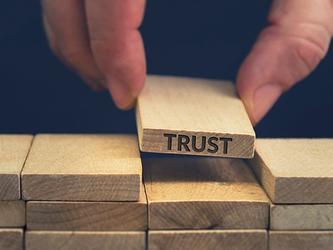What is the economic value of trust in data?
Data, when collected and used well, can be the basis of better decisions, better services and products, and better outcomes for people, organisations and societies. Over the years, many models and studies have attempted to quantify this value of data as an infrastructural enabler and creator of value. Data could, the models show, ‘unlock’ billions or trillions in value, along with a number of less easily quantifiable economic benefits.
At the Open Data Institute (ODI), we have long focused on gathering evidence about the barriers to enabling this value, while creating tools and processes to help foster data practices that avoid harmful impacts.
Our work with companies and governments around the world has shown us time and time again that two centrifugal forces are pushing us away from a healthy data ecosystem. First, a tendency towards data hoarding, with data seldom being accessible to the people who may create value from it. Second, a fear of data, driven in part by scandals such as the one around Cambridge Analytica.
Trust, or the lack thereof, is at the heart of this second centrifugal force. We know – in part thanks to surveys we ran with YouGov in 2018 and 2019 – that when it comes to collecting and using data about them, the public places very low levels of trust on most types of organisations. While nearly nine in 10 surveyed said that it was important or very important that organisations they interact with use data about them ethically, very few trusted social media organisations ( 5%) and marketing and advertising agencies ( 3%) to do so.
This fear of harms caused by the use and misuse of data can lead people to opt out of data collection or avoid using services, and organisations may avoid collecting, using or sharing data to avoid risks.
To understand better the impact of this lack of trust, we worked with economics consultancy Frontier Economics to try to quantify how much trust – or the lack of it – affects the value created by data flows.
The study, conducted at the end of 2020, looked at the impact of trust on data sharing, collection and use within a data ecosystem. Building on earlier work by the ODI to define and distinguish trust and trustworthiness as forces in data ecosystems, it aimed to quantify the economic value that can be attributed to the impact of trust on data sharing and collection in data ecosystems.
The heart of the project was a literature review of academic studies on trust and data sharing. The team selected and integrated seven academic studies – all looking at how trust impacts the willingness to share data – into a model of how increased (or decreased) trust affects flows of data and, therefore, the potential for the creation of value with data.
The team then combined the literature review with a study of counterfactuals and an exploration of the effect of policy interventions on data sharing. As a synthesis, an economic model was created to quantify the impact of trust – on a scale from no trust at all to total trust – on the willingness of people and organisations to share data.
The resulting model showed us that trust does indeed matter, and is one of the important parameters in the equation for the value of data: the study found that, on average, a 20% increase in trust would lead to a 5.4% increase in data sharing. This could be – cautiously – extrapolated to estimate that a significant increase in trust across the data ecosystem could create major positive impacts: billions in increased economic activity, better services, and better policies. It is important, however, to acknowledge the nuance in this result. Trust is a complex and dynamic factor, and the impact of an increase or loss of trust can be transient in some cases, and long-lasting in others.
To create a world where data works for everyone, we need trustworthy data to flow in well-governed ways around the data ecosystem.
Organisations and individuals accessing, using and sharing data need to be able to provide assurance, or be confident, that data is fit for purpose and trustworthy for their use.
That is why we have launched a programme to help organisations assess, build and demonstrate trust in, and the trustworthiness of, data and data practices. We believe the adoption of data-assurance products and services should reassure organisations that want to share or reuse data, and support better data-governance practices, fostering trust and sustainable behaviour change.
Olivier Thereaux is head of research and development, and Deborah Yates is principal consultant, at the ODI
This article was first published in the July 2021 issue of Impact.

We hope you enjoyed this article.
Research Live is published by MRS.
The Market Research Society (MRS) exists to promote and protect the research sector, showcasing how research delivers impact for businesses and government.
Members of MRS enjoy many benefits including tailoured policy guidance, discounts on training and conferences, and access to member-only content.
For example, there's an archive of winning case studies from over a decade of MRS Awards.
Find out more about the benefits of joining MRS here.












0 Comments